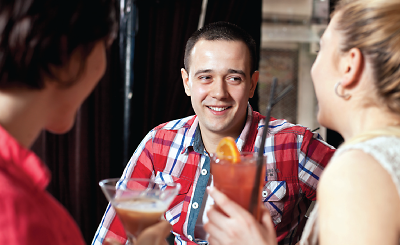Treating Social Anxiety Doesn’t Decrease Alcohol Consumption
Abstract
Does the comorbid psychiatric disorder always matter in the addiction treatment setting? Does the alcohol use disorder always matter in the psychiatric treatment setting? These questions were addressed by Sarah Book, M.D., at APA’s 2012 annual meeting in Philadelphia in May in the workshop “Management of Patients With Alcohol and Co-Occurring Disorders: Problems and Solutions.”
The workshop was presented by the National Institute on Alcohol Abuse and Alcoholism. Book is an associate professor at the Charleston Alcohol Research Center in the Department of Psychiatry and Behavioral Sciences at the Medical University of South Carolina, and her work is focused on the complicated relationship between social anxiety and alcohol use.

Some socially anxious individuals avoid a social situation altogether if they know they will be unable to drink alcohol before or during the event.
“People with anxiety are known to use alcohol to decrease their stress and feel more relaxed,” Book said. “Many individuals with anxiety disorders who use alcohol to cope with stress go on to develop alcoholism. If the underlying anxiety can be treated, either with medication or psychotherapy, we had thought that drinking should decrease. This might also prevent the development of more severe alcohol problems.”
Social anxiety is the most common anxiety disorder, second only to depression as a common psychiatric disorder, she noted. More than simple shyness, social anxiety involves an irrational fear of judgment by others in many kinds of social situations, and it is unique because it starts in adolescence, typically before experimentation with alcohol begins.
“We have conducted several studies over the past decade to better understand the relationship between social phobia and drinking,” said Book. “From research with community and clinical samples, we have learned that not only do individuals with social anxiety drink during social situations to feel more relaxed, they are also more likely to drink before engaging in a planned social activity that they believe will make them anxious.”
“Another finding generated by our group and others,” she explained, is that “many individuals who know that they are unable to drink alcohol either before going out, or while they are engaged in a social event, frequently will choose to avoid the situation altogether. These results helped better demonstrate how underlying anxiety initiates and maintains unhealthy alcohol use and also showed how important alcohol use becomes to such individuals. They believe that they ‘need’ alcohol, in order to participate in social situations.”
She described a study published in the May 2009 Addictive Behaviors, in which she and her colleagues assessed whether social anxiety serves as an impediment to successful outcomes in traditional forms of alcohol- and drug-use therapy. They evaluated 110 individuals seeking intensive outpatient substance abuse treatment at three community treatment programs; two of the programs were university-based and one was a women-only community-based program. They assessed participants using the Leibowitz Social Anxiety Scale and also administered the Beck Depression Inventory and the Penn State Worry Questionnaire. They then measured the participants’ willingness to participate in treatment using Likert-type items that evaluated four factors: willingness to talk to their therapist about their problems, willingness to talk in group therapy, willingness to attend Alcoholics Anonymous or Narcotics Anonymous meetings, and willingness to ask someone to be their sponsor in those 12-step programs.
Their analysis showed that the presence of social anxiety significantly predicted whether a patient reported that shyness interfered with ability to participate in treatment-related activities and that as many as one-third of individuals enrolled in such addiction treatment programs may be suffering from social anxiety disorder.
“Our results indicate a prevalence of 37 percent for comorbid social anxiety in frontline community substance abuse intensive outpatient treatment programs,” wrote Book and colleagues. “Importantly, when compared to a group without social anxiety, our results indicate that shyness negatively impacts [clients’] willingness to talk to their therapist about their problems, to talk in groups, to attend self-help meetings, and to ask for a sponsor. These findings have relevance for treatment providers as well as researchers.”
Would treating the social anxiety bode well for addressing the alcohol or substance abuse disorder? Book and her colleagues have addressed that question as well, she noted, conducting a placebo-controlled, randomized clinical trial to determine whether decreasing social anxiety with paroxetine would result in less alcohol use among anxiety treatment seekers who were not in an addiction treatment setting (Journal of Anxiety Disorders, March 2008). While treatment did reduce patients’ social anxiety, it did not reduce the quantity and frequency of their alcohol consumption. “Unfortunately, treating social anxiety was not enough to decrease overall alcohol use, and the picture turned out to be much more complex than originally thought.”
Disappointed but not daunted, Book and her colleagues continue their research in this area. “Our ultimate goal is to discover an effective treatment approach in socially anxious individuals … that results in less hazardous alcohol use.” 
An abstract of “Social Anxiety Impacts Willingness to Participate in Addiction Treatment” is posted at www.ncbi.nlm.nih.gov/pubmed/19195794. An abstract of “12-Step Therapy and Women With and Without Social Phobia: A Study of the Effectiveness of 12-Step Therapy to Facilitate AA Engagement” is posted at www.ncbi.nlm.nih.gov/pubmed/21423569. “Paroxetine Reduces Social Anxiety in Individuals With a Co-occurring Alcohol Use Disorder” is posted at www.ncbi.nlm.nih.gov/pmc/articles/PMC2254554/?tool=pubmed.



